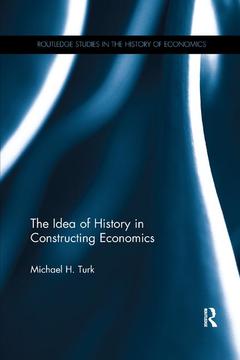The Idea of History in Constructing Economics Routledge Studies in the History of Economics Series
Auteur : Turk Michael H.

How scientific is economics? This question has often been framed by analogies and correspondences made between economics and other, seemingly more well-established scientific disciplines, starting with classical mechanics. At the same time economics is likely to be seen in opposition to or in contrast with history, where the reliance upon generalizing rules, thought experiments, and model construction in economics is set against the amassing of particular facts intended to create narratives in history.
In this new volume, Turk explores the relationship between economics and history, including the often fraught one between economics and economic history, making the case that economics does in fact require the proper grounding in history that has so often been ignored. This work challenges the attempt to link economics with other, more clearly ?scientific? disciplines as flawed and fundamentally wrongheaded. A key element of this book is its examination of the gaps and associations that exist in, or are seen through, linkages with thermodynamics, classical mechanics , biology, literature, mathematics, philosophy, and sociology. This exploration is frequently undertaken through study of the work of one or more major figures in the history of economic thought, ranging from Quesnay and Smith, through Walras and Max Weber, to Robinson, Krugman, David, and Arthur.
Through the possibility of an alternative to the gaps noted in each such comparison, the underlying, necessary connection between economics and history can be brought out. The book concludes by exploring the basis for the positive construction of a historical economics. This book is suited for those who study history of economic thought and philosophy of economics.
1. The Fault Line of Axiomatization 2. The Mathematical Turn In Economics 3. The Arrow of Time In Economics 4. Of Puzzles And Problems 5. Economics Pursuing The Mold of Evolutionary Biology 6. Economics as Plausible Conjecture 7. Max Weber and The Lost Thread Of Historical Economics 8. Historical Proof in Economics 9. The Fraught Relation Between Economics And Economic History 10. Toward A Positive Construction of Historical Economics
Michael H. Turk is Professor of Economics at Fitchburg State University, USA
Date de parution : 12-2019
15.6x23.4 cm
Date de parution : 08-2015
15.6x23.4 cm
Thème de The Idea of History in Constructing Economics :
Mots-clés :
Philosophy of economics; Economic methodology; Philosophy of history; Archiv Fur Sozialwissenschaften Und Sozialpolitik; History of economic thought; Dixit Stiglitz Model; Jurg Niehans; Common Language; Stanley Jevons; Late Twentieth Century Postmodernists; German Historical School; Physico Mathematical Sciences; Tobias Dantzig; Wittgenstein's Poker; neo-Kantian Distinction; Pure Political Economy; Knowledge Acquisition; Nash Equilibrium; Johannes Von Kries; Higher Steady State Level; Philip Mirowski; Increasing Returns; Von Kries; General Economic Equilibrium; Metaphorical Borrowing; Historical Proof; Plausible Conjecture; Economic Game Theory; General Economic History



